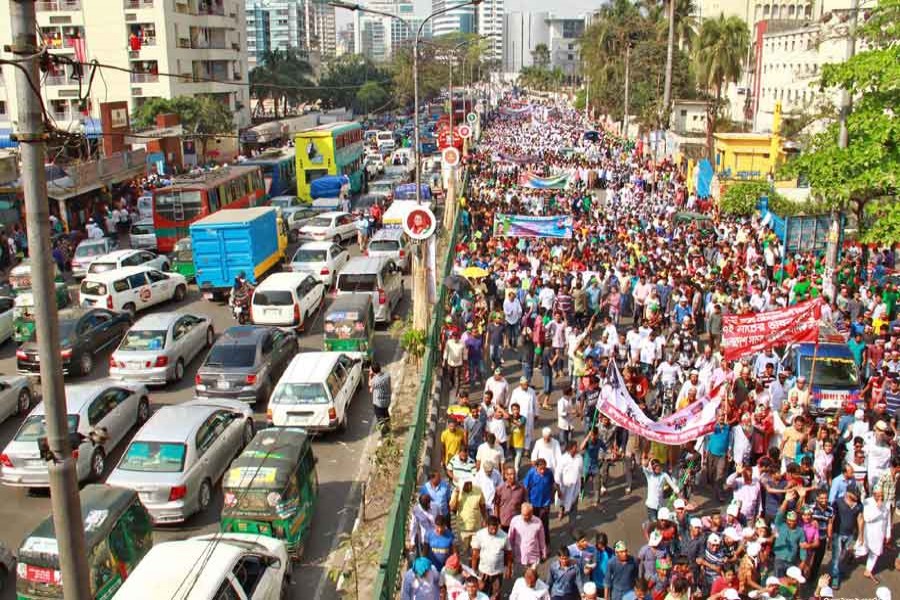Transport workers of some south-western districts kept buses and other passenger vehicles off the roads early this week protesting the new transport law.
The sudden strike caught thousands of passengers off guard. Many failed to travel to their desired destinations.
However, barring the deployment of eight mobile courts in Dhaka and in one or two other places by the Bangladesh Road Transport Authority (BRTA) on the first day of strike, there were no serious efforts on the authorities, including the traffic police, to enforce the new law.
Many policemen were seen pulling over some buses on busy road intersections in the capital during the BRTA mobile court drive to check papers of the vehicles and the drivers.
Traffic rule violations in Dhaka were committed as usual on most of the days; buses did ply in haphazard manner and pedestrians also gave a damn to traffic rules while crossing the busy city roads. Illegal parking and inoperative signal system were also noticed on almost all the city streets. The number of vehicles including buses and CNG-run auto-rickshaws were comparatively.
Road Transport and Bridges Minister Obaidul Quader, addressing he media, sought cooperation from all including striking transport workers in regard to enforcement of the new law. He said strict rules have been incorporated in the Road Transport Act (RTA) 2018 for valid reasons to ensure welfare and safety of all.
The law has many good elements for making it acceptable to all. Apart from bus drivers, transport owners have been made accountable. There is also the provision of financial assistance to accident victims and protection against environmental hazards.
The law enforcement agencies have been asked to implement the Act up to a 'reasonable' level at the beginning so as not to cause public harassment.
Despite opposition by transport workers, the government said the law will be executed for the sake of safety and discipline.
The authorities say the aim of the ongoing drive is mainly to make people conscious, not to punish them in a harsh way.
Traffic situation across the capital is deteriorating fast with induction of more cars and vehicles. There appears to be no easy solution in the foreseeable future.
The capital is now witnessing unprecedented congestion from early morning on almost every working day. It usually takes about two hours to travel a distance of only six kilometres during peak hours.
An overwhelming number of recklessly driven public transports are contributing to the intense traffic congestions. Successive governments had taken up a number of short-term plans like construction of overpasses and underpasses for vehicles, connecting roads, bypasses, and east-west roads, but none of those initiatives was implemented so far.
As such, traffic congestion is increasing beyond manageable proportions. Official statistics show over 0.3 million buses, trucks, and cars now ply the city roads, while about 20,000 vehicles on an average add to the number every year. The Dhaka city has only seven per cent road network compared to the international standard of 25 per cent.
The capital's traffic congestion problems can be largely addressed by relocating some establishments which occupy huge spaces at the heart of the city. A healthier and environment-friendly environment may then be created. For instance, the Kamlapur railway station can be gradually moved out to Tongi and beyond. Alternative rail link with Chottogram and Khulna may be planned from Narayanganj. The freed spaces can then be used to build roads and other transport related infrastructures.

- Monday, 25 November 2024 |
- Today's FE |
- e-Paper |
- Beta Website

